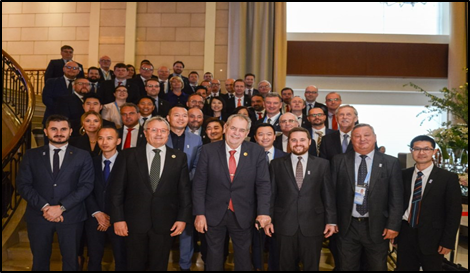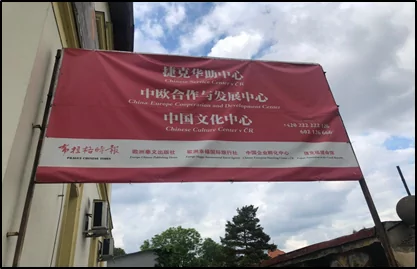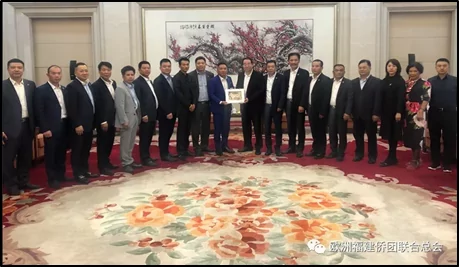
The Role of Coopted Diaspora Groups in Czech and European United Front Work
Publication: China Brief Volume: 20 Issue: 16
By:

Introduction
As is true in much of Europe, the influence of the Chinese Communist Party (CCP) in the Czech Republic heavily relies on the cultivation of political elites by party-state organs, overshadowing the role of coopted groups within the Chinese diaspora (China Brief, May 9; China Brief, January 17). However, the Chinese community’s previously under-researched interactions with PRC and European politics at the local and national level—as displayed in the CCP’s power to mobilize them for COVID-19-themed propaganda—point to a need to better understand the contribution of the CCP’s diaspora work to its larger political influence work in the continent.
Managing forces outside of the party—including the international Chinese diaspora—is the core task of one of the major areas of the party-state bureaucracy, the united front system (ASPI, June 9). Coordinated to a large (but not exclusive) degree by the CCP United Front Work Department (UFWD), diaspora work involves key agencies active in “overseas Chinese affairs” (侨务, qiaowu), such as:
- The Chinese People’s Political Consultative Conference (CPPCC), whose chair is the system’s top cadre;
- The eight CCP-led “democratic” parties (University of Adelaide, December 1997);
- The All-China Federation of Returned Overseas Chinese (中华全国归国华侨联合会, Zhonghua Quanguo Guiguo Huaqiao Lianhehui) (ACFROC), the primary qiaowu organ since 2018 (China Brief, May 9, 2019);
- The China Council for the Promotion of Peaceful National Reunification (中国和平统一促进会, Zhongguo Heping Tongyi Cujin Hui) (CCPPNR) and its global network of coopted diaspora organizations (China Brief, February 13, 2018; China Brief, May 9, 2019);
- The China News Service (中国新闻社, Zhongguo Xinwen She) (CNS) and its network of Chinese-language media outlets overseas (ASPI, June 9; Sinopsis, October 2, 2019).
The system’s partners abroad, for which the term “united front groups” has been proposed (ASPI, June 9), most visibly include the CCPPNR’s global network of “reunification” councils. These organizations have become tools for political influence in their home locales, a phenomenon thus far best observed in Australia and New Zealand (Parliament of Australia, 2018; New South Wales Independent Commission Against Corruption, 2019; Wilson Center, September 18, 2017; Sinopsis, November 16, 2018).
In Europe, the study and scrutiny of CCP elite-capture activity has so far focused largely on the Czech Republic (Sinopsis, March 11, 2019). Unlike in the Anglophone world, CCP-coopted groups within the small Czech Chinese community have kept a low profile, with entities outside the formal united front system—such as the CCP International Liaison Department (ILD) and the PLA-linked company CEFC—leading what has been called “united front work by other means” (China Brief, May 9, 2019). [1]
The united front system’s partners among the diaspora in Europe are involved in CCP influence activities, especially at the local level (Sinopsis, June 19, 2018; Sinopsis, October 2, 2019; Stockholm Free World Forum, May 29; Yle, March 15). [2] However, the Czech case shows that diaspora groups linked to the CCP united front system also help to advance CCP goals at the national and European level, as demonstrated by their involvement in the CCP’s recent pandemic crisis management.
Czech Qiaowu Under the Radar
The recent history of the most prominent Czech Chinese organizations fits a pattern familiar from other countries. Largely composed of recent migrants from the PRC, the Chinese diaspora in the country has offered the CCP ample opportunity for cooption, largely undisturbed by resistance from older diaspora organizations or pro-democracy movements. The recent history of the most prominent Czech Chinese organizations fits a pattern familiar from other countries. While the first lasting diaspora association once managed to keep some distance from PRC politics, [3] it has since been overshadowed by entities with close ties to the united front system. As with much of continental Europe, Chinese migration to the country only became significant in the 1990s, [4] dominated by arrivals from Zhejiang [especially Qingtian (青田) County, estimated to account for approximately 60 percent of the community] followed by a more recent wave from Fujian (Zhejiang Federation of Returned Overseas Chinese, November 27, 2012). [5]
Smaller, regional-based diaspora organizations tend to maintain exchanges with united front organs connected to their home areas, such as Guangdong or Henan (Sino-Czech Economic Trade & Cultural Exchange Association, September 15, 2018; Root in Henan, April 20, 2018). In the Czech Republic, the most prominent organizations connect to regional associations for Zhejiang and Fujian Provinces.
Zhejiang Diaspora Groups
In the Czech Republic, Qingtian diaspora leaders’ ties to the CCP reach the center of the united front system. Zhou Lingjian (周灵建), a businessman and owner of the country’s main Chinese-language newspaper, leads the Czech Qingtian Hometown Association (捷克青田同乡会, Jieke Qingtian Tongxianghui), established in 1999 (Economic View, September 25, 2018; China Overseas Chinese Network, February 14, 2017). Zhou was invited to the 2018 ACFROC conference in Beijing, attended by the full Politburo Standing Committee (Prague Chinese Times, August 30, 2018). Zhou claims to have been friends with former President Václav Klaus dating back to 2002; and Zhou joined President Miloš Zeman’s 2019 delegation to the PRC (see accompanying image) (Economic View, September 25, 2018; Seznam, March 18).
The association’s honorary chair Chen Naike (陈乃科), now back in the PRC, has joined the Zhi Gong Party (致公党, Zhi Gong Dang) and serves as an NPC delegate, while holding several provincial united front positions including an ACFROC vice-chairmanship (Zhi Gong Party, January 20, 2011; Qingtian Wang, May 27). Another Czech Qingtian leader was a non-voting delegate at a 2017 CPPCC session (Nouvelles d’Europe, March 5, 2017); and several of the association’s members hold positions at the Czech reunification council, including its honorary chair Milan Sun (孙悦新, Sun Yuexin) (Taiwan Scholar Association, July 1, 2019; Qingtian Wang, October 17, 2019).
Fujian Diaspora Groups
Among Fujianese personages, James Wu (吴瑞珍, Wu Ruizhen) stands out for his engagement with PRC and Czech politics. Wu, and various organizations he leads both at the Czech and European levels, enjoy close ties with Fujian provincial and lower-level united front organs. Wu has also mediated interactions between Czech business and education circles and a Shaanxi-based, state-run trade association. [6] Wu has held united front positions in the PRC and holds a leadership position in a pan-European diaspora group (European Federation of Fujianese Associations; Sinopsis, June 19, 2018). In the Czech Republic, Wu’s contacts have included sub-national level Czech lobbyists and politicians (such as a former mayor of a Prague district), as well as a former prime minister (Sinopsis, June 19, 2018; Prague Chinese Times, December 7, 2018; CCTV, June 22, 2016). He also mediates relations with the Czech Chamber of Commerce and Czech academia for PRC organs and businesses (Prague Chinese Times, December 3, 2018).
Smaller region-based diaspora organizations likewise maintain exchanges with united front organs in their home areas, such as Guangdong or Henan (Sino-Czech Economic Trade & Cultural Exchange Association, September 15, 2018; Root in Henan, April 20, 2018).
Professional Associations
Beyond the entities mainly linked to one region, some engage with agencies of the party-state on professional, rather than geographically-defined, lines. Wang Wanming (汪万明), a Tianjin businessman first sent to the Czech Republic by the China Youth Travel Service (run by the Communist Youth League), is a former chair of the united front-linked Czech Chinese Business Federation (捷克华商联合会, Jieke Huashang Lianhehui) (People’s Daily Overseas Edition, July 18, 2019; Europe-China Today, March 10, 2018). Wang currently leads the New Silk Road Chamber of Commerce and holds advisory positions with united front organs in Hunan and Shanghai (Prague Chinese Times, June 2; Czech Chinese Business Federation, November 15, 2018).

Czech United Front Groups as Vessels for CCP Influence
Although the main Czech united front groups are direct interlocutors of the CCP’s united front system, the local political engagement of some of their prominent figures mostly takes place through organizations in which they share leadership posts with Czech nationals linked to politics and media. [7] Often limited to the local level, their role in Czech-PRC contacts has nevertheless also included participation in high-level delegations to the PRC.
Milan Sun leads the Czech-China Center, focused on cultural and business activities, together with Petr Petržílek, an adviser to the first deputy prime minister (Deník N, November 12, 2018). Its leadership also includes a member of the Revolutionary Kuomintang (KMT), one of the United Front’s eight minor parties (Revolutionary KMT, February 28). The organization’s leaders have joined two presidential delegations to the PRC, as well as one led by the speaker of the Chamber of Deputies (Czech-China Center, November 10, 2018; April 30, November 11, 2019). The group has co-organized several cultural events, which have involved Czech communist politicians and a CEFC-linked entity (Sinopsis, July 20, 2019).
Wang Wanming’s New Silk Road Chamber of Commerce includes a Czech media specialist close to the Czech Social Democratic Party and to a “conspiracy theory website” (Lidovky, September 16, 2016). The chamber has mainly focused on educational exchange, leading several Czech university and business delegations to the PRC (Hebei Normal University, January 8, 2018; Hunan Normal University, January 11, 2018; Czech Chinese Business Federation, November 15, 2018; Prague Chinese Times, April 7, 2017). Wang has been appointed an international trade expert at the University of West Bohemia’s New Technologies Research Center (University of West Bohemia, undated). The chamber has also established a strategic partnership with Hebei Province (Hebei Qiaolian, August 30, 2018).
“Coronaprop” and the CCP’s Global Mobilization of United Front Groups
The success of the CCP’s overseas Chinese work was on display in the mobilization of coopted diaspora groups during the COVID-19 pandemic—first organizing shipments of personal protective equipment (PPE) to, and then later from, China. [8] The CCP has conducted a coronavirus-themed propaganda effort that first covered up the epidemic, and then sought to portray the CCP as saving the world from it (China Brief, January 29; China Brief, April 1; China Brief, June 24). This effort, sometimes called “coronaprop” in Europe, has demonstrated the effectiveness of united front tactics. Specifically, PPE donations (or sales) mediated by CCP-friendly figures helped to raise their profile, empower their propaganda, and influence proxies (Aktuálně.cz, May 22).
PRC united front organs played a direct role in European coronaprop, with their Czech counterparts often active beyond the national level. [9] In a case that attracted rare mainstream media attention, Zhou Lingjian’s Czech Qingtian Hometown Association was entrusted to deliver rice and PPE to Qingtianese in Italy on behalf of Qingtian united front organs. They failed at the PPE part: invoking emergency state powers, the Czech Ministry of Interior ordered police to raid Zhou’s warehouse after discovering that a company had attempted to sell equipment in that warehouse to local hospitals at above market prices (Aktuálně.cz, March 26). Zhou’s association later continued distributing PPE among the diaspora, directly entrusted to do so in one case by the Zhejiang UFWD and ACFROC (Prague Chinese Times, May 30).
The operation also involved James Wu, who established a European PPE distribution station with the help of the Fujian Province party secretary and the UFWD (WeChat, April 13). The Czech-China Center and New Silk Road Chamber of Commerce donated PPE to Czech municipalities and institutions. In the chamber’s case, the donation was made on behalf of the Hunan party committee and government (Hlídací pes, May 6; Prague Chinese Times, June 2).

The European Projection of Czech Qiaowu
Czech united front groups have played an outsized role in some pan-European diaspora organizations, considering the relatively small size of the country and its Chinese community. Participation in European-level qiaowu has given these groups enhanced access to both central PRC organs and European politics. For example, Czech Qingtian diaspora leader Zhou Lingjian was among the founders of the Brussels-based European Chinese Youth Federation (欧洲华侨华人青年联合总会, Ouzhou Huaqiao Huaren Qingnian Lianhe Zonghui) and has chaired it since 2016 (Faguo Qiaowang, May 18, 2011; Zhejiang Federation of Returned Overseas Chinese, December 13, 2016). The organization’s events have been attended by PRC and European political figures, to include: the All-China Youth Federation’s secretary-general, a Zhi Gong Party vice-chair, the secretary-general of the European Parliament China Friendship Group, and a vice-chair of the Luxembourg parliament (Faguo Qiaowang, May 18, 2011; Guangming News, October 16, 2019; Capital News, May 5, 2019; Xinhua, May 17, 2017).
James Wu is one of the leaders of the European Federation of Fujianese Associations (欧洲福建侨团联合总会, Ouzhou Fujian Qiaotuan Lianhe Zonghui) (EFFA), founded in Italy in 2015. The organization maintains exchanges with agencies such as the UFWD, the ACFROC, and the Revolutionary KMT at the central and lower levels (Southeastern Network: Hong Kong, April 9, 2018; WeChat, October 13, 14 and 17, 2019). In order to raise its “influence and status” in Europe, the EFFA granted honorary chairmanships to a former captain regent of San Marino and a former chairwoman of the Italian Chamber of Deputies (Fujian Qiaobao via Soubao Wang, October 8, 2015).
The pandemic also provided an opportunity for a European-level projection of the activity of the united front system’s Czech contacts. The EFFA donated PPE to an Italian town, while the European Parliament EU-China Friendship Group (a Czech-led informal organization whose interlocutors across the CCP influence apparatus include united front organs) distributed equipment at the parliament (Olian News, April 17; Literární noviny, April 7; Sinopsis, November 26, 2019).
Conclusion
The CCP united front system’s cooption of diaspora organizations in continental Europe demonstrates how it can engage in political influence activities, even if the results are limited compared to the elite capture achieved through other means. Coopted diaspora groups help insert CCP politics into the Chinese community, with the leaders of the main organizations in regular contact with united front cadres, and local Chinese-language media aligned with PRC propaganda. They do more than this, however: through exchanges with mainstream political and other CCP-friendly figures, local united front groups help manage support for CCP policies, playing an auxiliary role in influence activities affecting the larger society. Under-the-radar interactions between provincial Chinese and local governments; influence on public perceptions of matters sensitive to the CCP, such as the COVID-19 crisis; control over local media in a minority language; and representation of the ethnic community in contacts with top political figures are all aspects of the politics of European countries over which the CCP has gained leverage through the united front system’s diaspora work.
Research used in this article is part of the author’s master’s thesis at Charles University in Prague, defended on September 8, 2020. He would like to thank Jichang Lulu for substantial edits and Martin Hála and Alex Joske for helpful comments.
Filip Jirouš is a Sinologist and researcher with Sinopsis.cz, a Prague-based project that provides analysis of China-related topics in Europe, where he focuses on united front work.
Notes
[1] Estimates of the number of “overseas Chinese” in the Czech Republic have generally given similar figures to Czech statistics that give the number of PRC passport holders with Czech residence permits, 8263 in 2020 (Qingtian Wang, October 17, 2019; Czech Interior Ministry, May 31). While these figures cannot be equated with the size of the “Chinese community,” one may argue they serve as an indicator of the order of magnitude in the Czech case.
[2] On influence activities at the local level, see Sinopsis, October 22, 2018; China Brief, June 26, May 9, 2019.
[3] The Association of Chinese in the Czech Republic (旅捷华人联谊会, Lü Jie Huaren Lianyihui), interview with Dr. Zlata Černá, Prague, June 30.
[4] Gregor Benton and Frank N. Pieke (eds.), The Chinese in Europe, 1998; a handful of Chinese migrants arrived to Czechoslovakia after the Great War (University of Hong Kong, 2002, pp. 224, 226, 230).
[5] Mette Thunø, “Chinese in Denmark”, in Gregor Benton and Frank N. Pieke (eds.), The Chinese in Europe, 1998, p. 180; Pál Nyíri, Chinese in Eastern Europe and Russia: a middleman minority in a transnational era, 2007, p. 65.
[6] The Shaanxi branch of China Council for the Promotion of International Trade (中国国际贸易促进委员会, Zhongguo Guoji Maoyi Cujin Weiyuanhui), an organ focusing on business and trade supporting CCP policy goals abroad (China Brief, June 26, 2019; Sinopsis, November 26, 2019).
[7] While not chiefly linked to diaspora organizations, the most prominent entity of this type involved in CCP influence activity also points to the long-term relevance of united front work abroad. The Mixed Czech-Chinese Chamber of Mutual Cooperation, run by a former minister, supported by a Chinese SOE and a Czech PRC-invested conglomerate and active in the promotion of CCP initiatives within the Czech state (China Brief, January 17), counts among its leaders a former overseas Chinese student once quoted with customary patriotic statements in an article in a magazine published by the Western Returned Scholar’s Association, a united front organ that liaises with students and scholars abroad (Shenzhou Xueren, January 14, 2010). The chamber’s influence activities have included the promotion of CCP initiatives from a BRI “center” embedded in a Czech ministry (Sinopsis, July 28, 2019) and its annual (now suspended) “China Investment Forum”, co-organized by an ILD unit, attended by prominent PRC politicians and the cream of Czech politics and business (Mixed Czech-Chinese Chamber of Mutual Cooperation; Seznam zprávy, February 26).
[8] Local activities within this global operation were described for the case of Spain and Argentina by Juan Pablo Cardenal (CADAL, May 11).
[9] For examples in Italy, Slovakia and Lithuania (China Overseas Chinese Network, March 17; Aktuality.sk, April 2; Lietuvoje gyvenančių išeivių iš kinijos asociacija, February 16).



